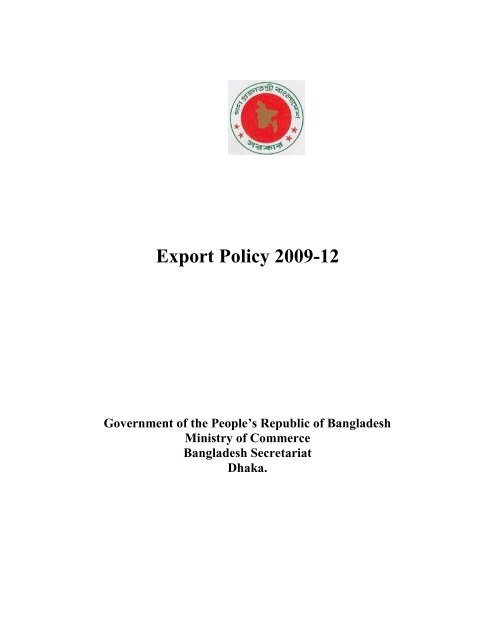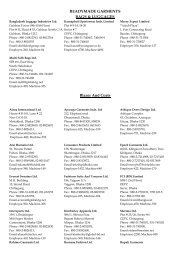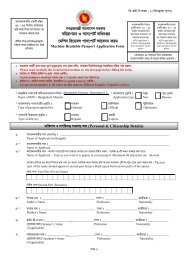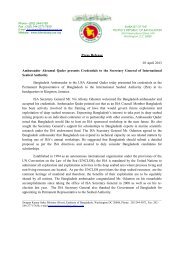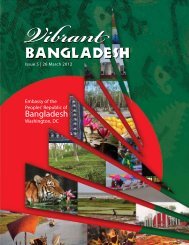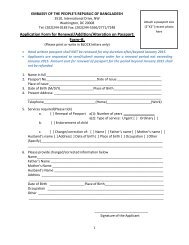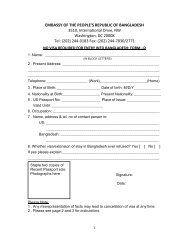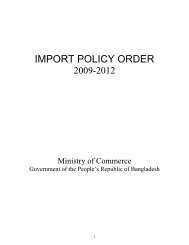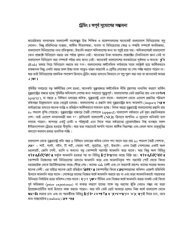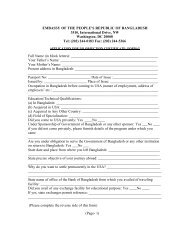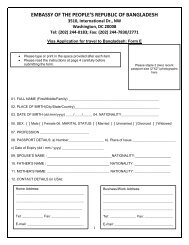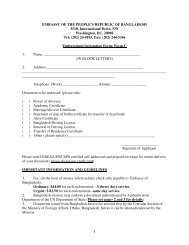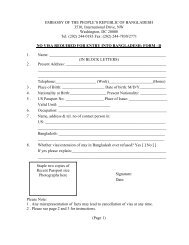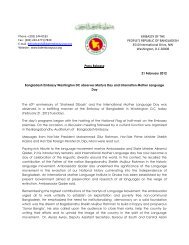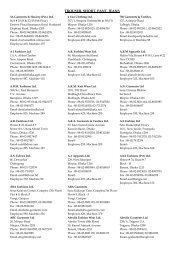Export Policy of Bangladesh
Export Policy of Bangladesh
Export Policy of Bangladesh
Create successful ePaper yourself
Turn your PDF publications into a flip-book with our unique Google optimized e-Paper software.
<strong>Export</strong> <strong>Policy</strong> 2009-12<br />
Government <strong>of</strong> the People’s Republic <strong>of</strong> <strong>Bangladesh</strong><br />
Ministry <strong>of</strong> Commerce<br />
<strong>Bangladesh</strong> Secretariat<br />
Dhaka.
<strong>Export</strong> <strong>Policy</strong> 2009-2012
Contents<br />
SL. No Chapters Subject Page No<br />
1 Preface 1-2<br />
2 Chapter One Title, Objectives, Strategies, Application and<br />
Scope<br />
3 Chapter Two General Provisions for <strong>Export</strong> 6-8<br />
4 Chapter Three Steps toward <strong>Export</strong> Diversification 9-11<br />
5 Chapter Four General <strong>Export</strong> Facilities 12-18<br />
6 Chapter Five Product-Specific <strong>Export</strong> Facilities 19-23<br />
7 Chapter Six <strong>Export</strong> <strong>of</strong> Services 24<br />
8 Chapter Seven Other Steps towards <strong>Export</strong> Promotion 25<br />
9 Annex-1 List <strong>of</strong> <strong>Export</strong>-Prohibited Products 26<br />
10 Annex-2 List <strong>of</strong> Products under Conditional <strong>Export</strong> 27<br />
The <strong>Export</strong> <strong>Policy</strong> 2009-12 has been published both in Bengali and English Languages. If<br />
there is any inconsistency between the two versions, the Bengali text will prevail.<br />
3-5
<strong>Export</strong> <strong>Policy</strong> 2009-12<br />
Preface<br />
Trade and Commerce is one <strong>of</strong> the prime driving forces <strong>of</strong> socio-economic development.<br />
The objectives <strong>of</strong> the trade-led growth strategy <strong>of</strong> the Government include reducing the<br />
poverty level to a half by 2015 through generation <strong>of</strong> employment and income. World<br />
trade is persistently witnessing changes and developments caused by globalization and<br />
evolving free market economy. The <strong>Export</strong> <strong>Policy</strong> primarily aims at making the<br />
economic activities dynamic and outward looking to help <strong>Bangladesh</strong> survive in the<br />
rapidly changing and competitive global trading system. This calls for increasing<br />
involvement <strong>of</strong> women in trade expansion activities by reducing discrimination between<br />
men and women, which will play a positive role in the economic development <strong>of</strong> the<br />
country through strengthening our economic foundation. It will help our exporters and<br />
producers get equipped with more strength and competitiveness needed to face the<br />
challenges <strong>of</strong> the changing global trade. In this backdrop, the government is facilitating<br />
expansion <strong>of</strong> trade and taking necessary steps to modernize and simplify the country‟s<br />
trade policy in accordance with WTO obligations and upholding country‟s interest.<br />
Recently pressure from the buyers is mounting for improvement <strong>of</strong> quality <strong>of</strong> products,<br />
export <strong>of</strong> products free from any hazardous and toxic substances, including fulfillment <strong>of</strong><br />
other standards and compliance-related conditions. Comprehensive efforts are being<br />
made for increasing productivity and improving quality <strong>of</strong> products through fulfillment <strong>of</strong><br />
various compliance conditions. Besides, our export market is influenced by world<br />
economic dynamics caused by globalization. Therefore, dynamics <strong>of</strong> global economy and<br />
international trade have to be monitored, and <strong>Bangladesh</strong> Missions abroad will have to<br />
play more proactive and effective role in this regard. Simultaneously, efforts will be<br />
made to hone the skills <strong>of</strong> the exporters on the rules and regulations <strong>of</strong> international trade.<br />
There is no denying the fact that the present trading system, especially the export in<br />
business is experiencing increased use <strong>of</strong> modern technology and this, in turn, is helping<br />
the exporters become more competitive. On the other hand, the objectives <strong>of</strong> reducing<br />
cost <strong>of</strong> doing business alongside enhancement <strong>of</strong> the efficiency <strong>of</strong> exporters through<br />
increased use <strong>of</strong> modern technology in the export sector could be attained. The<br />
government is firmly committed to ensuring the maximum use <strong>of</strong> e-Commerce and<br />
modern technology to accomplish this objective. Most importantly, the government is<br />
attaching more importance on converting our comparative advantages into competitive<br />
advantages through proper and efficient utilization <strong>of</strong> manpower.<br />
In order to sustain our current export growth, we need to augment the production capacity<br />
<strong>of</strong> local export-oriented industries, give more emphasis on protection <strong>of</strong> environment <strong>of</strong><br />
the factories including execution <strong>of</strong> compliance requirements, improve the quality <strong>of</strong> the<br />
products, and above all strengthen our efforts to diversify products and their markets. All<br />
these objectives can be attained only when we can utilize our cheap labor to convert its<br />
comparative advantage into competitive advantage. In doing so, labor-intensive exportoriented<br />
industries will be encouraged, massive training programs will be organized to
enhance the skills <strong>of</strong> workers and various incentives will be doled out to encourage and<br />
diversify exports. Besides, loan facilities at reduced interests will be arranged,<br />
infrastructural development activities will be geared up and establishment <strong>of</strong> backward<br />
and forward-linkage industries will be encouraged. Also, steps will be taken to develop<br />
utility services, install state-<strong>of</strong>-the art laboratories for controlling the quality <strong>of</strong> exports,<br />
set up product-based industrial zones or clusters, ensure easy availability <strong>of</strong> raw materials<br />
for exports, disseminate updated information to the producers on markets and technology<br />
on a regular basis, and ensure overall development <strong>of</strong> the Chittagong and Mongla Ports<br />
including further simplification <strong>of</strong> procedures for releasing goods.<br />
The <strong>Export</strong> <strong>Policy</strong> 2009-12 has underscored the need for expanding export, increasing the<br />
productivity <strong>of</strong> export-oriented industries and facilitating the overall development <strong>of</strong> the<br />
export sector through capacity building <strong>of</strong> local export-oriented industries. Five Business<br />
Promotion Councils are already in place under public-private partnership to enhance the<br />
capacity and awareness <strong>of</strong> the exporters and mitigate the supply constrains paving the<br />
way for enhanced uninterrupted supply <strong>of</strong> export products. The scope <strong>of</strong> these councils<br />
will be gradually expanded. <strong>Export</strong> statistics <strong>of</strong> the last few years reveal that export<br />
earnings have witnessed growths <strong>of</strong> 15.69%, 15.87% and 10.23% during export years<br />
2006-07, 2007-08 and 2008-09 respectively. The “<strong>Export</strong> <strong>Policy</strong> 2009-12” has been<br />
formulated on the basis <strong>of</strong> recommendations <strong>of</strong> a Consultative Committee comprising <strong>of</strong><br />
representatives from the main industries/trade associations, chambers, research<br />
organizations, respective Ministries, Divisions and organizations so to ensure the<br />
sustainability <strong>of</strong> the export growth during the policy period. It is expected that this <strong>Export</strong><br />
<strong>Policy</strong> will play the pioneering role in employment generation and poverty alleviation<br />
through burgeoning growth <strong>of</strong> our export.
Chapter One<br />
Title, objectives, strategies, application and scope<br />
1.0 Title<br />
This <strong>Policy</strong> shall be called the <strong>Export</strong> <strong>Policy</strong> 2009-12.<br />
1.1 Objectives<br />
1.1.1 Updating and liberalizing the trade regime in accordance with the needs and<br />
requirements <strong>of</strong> the World Trade Organization and globalization;<br />
1.1.2 Encouraging labor-intensive (especially female labor) export-oriented production;<br />
1.1.3 Ensuring availability <strong>of</strong> raw materials for manufacturing export goods;<br />
1.1.4 Increasing productivity and diversity <strong>of</strong> products;<br />
1.1.5 Improving the quality <strong>of</strong> products; encouraging the use <strong>of</strong> modern, appropriate<br />
and environment-friendly technology, producing high-end products, and<br />
improving the design <strong>of</strong> the products;<br />
1.1.6 Enhancing efficiency and dynamism by using e-Commerce and e-Governance;<br />
1.1.7 Initiating new strategies for the expansion <strong>of</strong> the markets for export products,<br />
making proper utilization <strong>of</strong> computer technology and encouraging all modern<br />
technologies including e-Commerce;<br />
1.1.8 Assisting the development <strong>of</strong> necessary infrastructure, particularly for backward<br />
and forward linkages in order to encourage the production <strong>of</strong> exportable goods;<br />
1.1.9 Providing all-out support to new exporters as well as to existing exporters;<br />
1.1.10 Assisting the development <strong>of</strong> a skilled labor-force through proper training for<br />
managing international trade; and<br />
1.1.11 Providing adequate guidance to trade bodies, business organizations, business<br />
people and related individuals in understanding the changing international trading<br />
system, etc.<br />
1.2 Implementation Strategy<br />
1.2.1 Increasing the institutional skills and efficiency <strong>of</strong> the <strong>Export</strong> Promotion Bureau<br />
(EPB), providing assistance in capacity building <strong>of</strong> the Customs Authorities, sea<br />
and land port authorities, Department <strong>of</strong> Fisheries, BSTI, Tea Board and different<br />
trade bodies;<br />
1.2.2 Modernizing <strong>Bangladesh</strong> Foreign Missions abroad by strengthening economic<br />
diplomacy;<br />
1.2.3 Strengthening and expanding the “Product based Business Promotion Council”<br />
activities through joint initiatives <strong>of</strong> public and private sectors to encourage the<br />
production and export <strong>of</strong> potential goods;<br />
1.2.4 Providing assistance to producers and exporters in collecting market intelligence<br />
information on the demands for commodities abroad, expanding markets,<br />
attaining competitive and higher price, etc.<br />
1.2.5 Extending support to export facilitating agencies by introducing automation and<br />
e-Governance for enhancing work-efficiency and ensuring transparency and<br />
accountability;<br />
1.2.6 Providing assistance for updating and modernizing the over all trade system by<br />
ensuring the best use <strong>of</strong> all modern technologies including e-Commerce for
making the export products more competitive through reducing cost <strong>of</strong> business,<br />
increasing production, expanding market and shortening lead time;<br />
1.2.7 Disseminating latest information to the exporters on export markets and<br />
technology to facilitate diversification <strong>of</strong> exports;<br />
1.2.8 Creating training opportunities and establishing sector-specific training institutes<br />
for workers, staff and management personnel to increase productivity;<br />
1.2.9 Encouraging promotion <strong>of</strong> export through increased institutional facilities<br />
including trading and export houses;<br />
1.2.10 Providing assistance in establishing internationally accredited certification system<br />
to ensure the quality <strong>of</strong> the products;<br />
1.2.11 Encouraging the establishment <strong>of</strong> product-wise design centers for improvement <strong>of</strong><br />
product designs;<br />
1.2.12 Assisting producers in using modern technology for production;<br />
1.2.13 Providing supports to the exporters to get acquainted with the working procedures<br />
<strong>of</strong> significantly successful exporting countries;<br />
1.2.14 Providing various financial and tax subsidies or incentives including low-interest<br />
loans to exporters;<br />
1.2.15 Reducing lead time in export by means <strong>of</strong> improvement <strong>of</strong> port management and<br />
infrastructure, simplification <strong>of</strong> procedures for releasing goods, and improvement<br />
<strong>of</strong> the transport system;<br />
1.2.16 Sending trade missions abroad and providing support to exporters to hold single<br />
country fairs abroad as well as to participate in different international trade fairs<br />
to familiarize and market the products;<br />
1.2.17 Taking all necessary initiatives for achieving duty-free market access to<br />
developed and developing countries including United States for expanding<br />
markets for <strong>Bangladesh</strong>i products and services abroad;<br />
1.2.18 Taking special initiatives to enhance exports <strong>of</strong> products and services to South<br />
Asia, Middle East and other Asian and African countries;<br />
1.2.19 Awarding CIP status and National <strong>Export</strong> Trophy every year to the best exporters<br />
<strong>of</strong> different sectors in recognition <strong>of</strong> producing new products, diversifying <strong>of</strong><br />
products, enhancing exports, etc;<br />
1.2.20 Reviewing country‟s export situation at least once annually and providing<br />
necessary directions by the “National Committee on <strong>Export</strong>”;<br />
1.2.21 Monitoring and evaluating the progress <strong>of</strong> the implementation <strong>of</strong> the decisions <strong>of</strong><br />
the “National Committee on <strong>Export</strong>, by the task force established for this purpose;<br />
and<br />
1.2.22 Identifying the problems related to export and recommending possible remedies<br />
by the <strong>Export</strong> Monitoring Committee headed by the Vice-Chairman <strong>of</strong> the <strong>Export</strong><br />
Promotion Bureau and represented by the private sector including FBCCI;<br />
1.3 Application and Scope<br />
1.3.1 Unless otherwise stated, the <strong>Export</strong> <strong>Policy</strong> 2009-12 shall be applicable to exports<br />
<strong>of</strong> all types <strong>of</strong> goods and services from <strong>Bangladesh</strong>.<br />
1.3.2 The <strong>Export</strong> <strong>Policy</strong> 2009-12 shall be effective from the date <strong>of</strong> its publication in<br />
the <strong>Bangladesh</strong> Gazette, and shall remain in force until June 30, 2012. However,<br />
this <strong>Export</strong> <strong>Policy</strong> shall remain effective until the next <strong>Export</strong> <strong>Policy</strong> is issued.
1.3.3 This policy shall be applicable to all places in <strong>Bangladesh</strong> except the <strong>Export</strong><br />
Processing Zones (EPZs).<br />
1.3.4 Any tax/ tariff related decision declared in the National Budget or by the National<br />
Board <strong>of</strong> Revenue shall prevail over the <strong>Export</strong> <strong>Policy</strong>.<br />
1.3.5 Whatever is stated in this policy, any specific decision related to export issued by<br />
the government through any other order shall prevail over this policy even if the<br />
order is inconsistent with any section <strong>of</strong> this policy.<br />
1.3.6 The Government will review the <strong>Export</strong> <strong>Policy</strong> at least once a year, and make any<br />
modification, expansion or amendment, if necessary.
Chapter Two<br />
General Provisions for <strong>Export</strong><br />
2.0 Rules and Regulations to be followed for <strong>Export</strong> <strong>of</strong> Products<br />
The conditions stipulated in this <strong>Policy</strong> or in other related laws, and the rules and<br />
regulations related to foreign currency exchange issued from time to time by the<br />
<strong>Bangladesh</strong> Bank have to be followed in case <strong>of</strong> export <strong>of</strong> goods from<br />
<strong>Bangladesh</strong>. Besides, relevant documents within the scope <strong>of</strong> the abovementioned<br />
conditions and rules and regulations have to be followed.<br />
2.1 Control <strong>of</strong> <strong>Export</strong> <strong>of</strong> Products: Under this <strong>Policy</strong>, export <strong>of</strong> products will be<br />
controlled in the following ways such as:-<br />
2.1.1 <strong>Export</strong> Prohibited Products: Unless otherwise stated, products prohibited under<br />
this <strong>Export</strong> <strong>Policy</strong> cannot be exported. Annex -1 reads the list <strong>of</strong> export prohibited<br />
products.<br />
2.1.2 Products under Conditional <strong>Export</strong>: Products which are exportable under some<br />
conditions can be exported only after fulfilling those conditions. Such products<br />
have been listed in Annex-2.<br />
2.2 <strong>Export</strong>able Products: Unless otherwise stated, all other products except the<br />
products enlisted in Annex-1 and Annex-2, i.e. export prohibited products and the<br />
products whose export is contingent upon certain conditions shall be freely<br />
exportable.<br />
2.2.1 Nothing in this policy shall be applicable to the following:<br />
2.2.1.1 Store, equipment or spare parts <strong>of</strong> ships, vehicles or aircrafts bound for going<br />
abroad, and products declared as their kitchen items, or the baggage accompanied<br />
by the sailors or the crews and passengers <strong>of</strong> those ships, vehicles or aircrafts.<br />
2.2.1.2. <strong>Export</strong> <strong>of</strong> samples subject to fulfillment <strong>of</strong> the following conditions:<br />
a) The product is not export prohibited;<br />
b) A maximum <strong>of</strong> US$ 5,000 worth <strong>of</strong> products (except medicine) based on FOB<br />
price (free on board) per exporter per year;<br />
c) Products sent as samples free <strong>of</strong> cost; provided that in case <strong>of</strong> medicine the<br />
maximum shall be (1) US$ 30,000 if there is no export L/C (letter <strong>of</strong> credit), or<br />
(2) 5% <strong>of</strong> the total value <strong>of</strong> the L/C or US$ 5000, whichever is less. <strong>Bangladesh</strong><br />
Bank can increase these limits examining each case, if necessary.<br />
d) For 100% export-oriented garment industries, a maximum <strong>of</strong> US$ 7,500 worth<br />
<strong>of</strong> samples <strong>of</strong> ready made garments per year;
e) The diamond processing farms having bond licenses issued from the Customs<br />
bond Commissionerate or diamond producing/ diamond-studded jewelery<br />
processing farms registered as producers with VAT Commissionerate, under<br />
National Board <strong>of</strong> Revenue can send abroad cut and polished diamond/diamondstudded<br />
jewelery worth <strong>of</strong> US$ 50,000 annually with a view to participating in<br />
international trade fair or showcasing for export market development. In this case<br />
the samples must be brought back to the country after the show. However, if the<br />
samples are sold, all sale proceeds must be repatriated through legal banking<br />
channel and the amount <strong>of</strong> the proceeds shall not be less than the value <strong>of</strong> the<br />
samples;<br />
f) Promotional materials (brochure, poster, leaflet, banner etc.) <strong>of</strong> any price or<br />
weight;<br />
g) Gift parcel worth <strong>of</strong> US$ 1,000 or equivalent in <strong>Bangladesh</strong>i Taka;<br />
h) Bonafide baggage <strong>of</strong> travelers traveling outside <strong>Bangladesh</strong>; and<br />
i) Relief materials exported by the Government.<br />
2.2.2 “Sample” means limited amount <strong>of</strong> goods which are easily identifiable and which<br />
do not have any commercial value.<br />
2.2.3. “Gift parcel” means gift materials sent through courier service.<br />
2.3 Authority to relax export control:- The Government showing appropriate<br />
reasons can authorize the export <strong>of</strong> prohibited goods listed in Annex-1. Moreover,<br />
the Government can authorize, under special considerations, export, export-cumimport<br />
or re-export <strong>of</strong> certain products.<br />
2.4 Entre-pôt and Re-export:- Entre-pôt trade and re-export shall have to be<br />
conducted under the procedures stipulated in the Public Notice No. 42 (2003-<br />
2006)/import dated June 28, 2005 (14 Ashar 1412 Bangla) issued by the Office <strong>of</strong><br />
the Chief Controller <strong>of</strong> Import and <strong>Export</strong> .<br />
2.4.1 Entre-pôt trade means the export <strong>of</strong> an imported product at a price at least 5%<br />
higher than the import price. No change whatsoever in the quality, quantity, shape<br />
or any other aspect is necessary in this respect. Products under entre-pôt trade<br />
shall not come out <strong>of</strong> the port boundary. However, the products can be brought<br />
out <strong>of</strong> the port boundary under special authorization.<br />
2.4.2 “Import price” under entre-pôt trade shall refer to the C&F price <strong>of</strong> the imported<br />
product as declared at the port <strong>of</strong> <strong>Bangladesh</strong>.<br />
2.4.3 “Re-export” means the export <strong>of</strong> an imported product within a specific period <strong>of</strong><br />
time with a value addition <strong>of</strong> at least 10% to the imported price by changing the<br />
quality or shape or both <strong>of</strong> the product by means <strong>of</strong> local reprocessing.
2.4.4 Import price in this case shall refer to the C&F price <strong>of</strong> the imported product as<br />
declared at the port <strong>of</strong> <strong>Bangladesh</strong>.<br />
2.5 <strong>Export</strong> opportunities without L/C:- <strong>Export</strong>s without L/C can be done through<br />
buying contract, agreement, purchase order or advance payment subject to the<br />
submission <strong>of</strong> EXP Form and Shipping Bill. In case <strong>of</strong> Advance Cash Payment,<br />
export without L/C will be allowed on consignment basis.<br />
2.5.1 “Buying Contract” means a signed agreement between an exporter and an<br />
importer for the purpose <strong>of</strong> exporting a product.<br />
2.6 <strong>Export</strong>-cum-Import<br />
2.6.1 Cylinder and ISO tanks can be exported on a temporary basis only for the purpose<br />
<strong>of</strong> repairing, replacement or refilling <strong>of</strong> the imported products. However, an<br />
Indemnity Bond shall have to be submitted to the Customs Authorities at the time<br />
<strong>of</strong> export stating that the products will be imported back after completion <strong>of</strong> the<br />
necessary works.<br />
2.6.2 <strong>Bangladesh</strong>i exporters will be authorized to export replacement products in case<br />
the exported product is found faulty as per the sales agreement. However, the<br />
exporter shall have to submit the following papers to the Customs Authorities:<br />
a) Copy <strong>of</strong> the Sales Agreement;<br />
b) Letter from the buyer with details <strong>of</strong> the faulty products; and<br />
c) Any other condition to be met according to the Customs Law.<br />
2.6.3 A person traveling to a foreign country can bring his or her vehicle along with<br />
himself or herself if authorized under the carnet de passage by the Customs<br />
Authorities or any other appropriate authority, or authorized against the indemnity<br />
bond submitted to the Customs Authorities with the condition to re-import.<br />
2.6.4 Re-exportation <strong>of</strong> Frustrated Cargo:- A frustrated cargo can be re-exported in<br />
compliance with the rules and regulations <strong>of</strong> the Customs Act 1969.<br />
2.6.5 The construction, engineering and electrical company shall be allowed<br />
temporarily to export-cum-import machinery for doing work as per contract under<br />
the following conditions:<br />
a) Relevant copies <strong>of</strong> agreement and award have to be submitted to the<br />
Customs Authorities; and<br />
b) An indemnity bond has to be submitted stating that the machinery shall<br />
be returned after the completion <strong>of</strong> the task.<br />
2.7 Pre-shipment Obligations:- Unless other conditions apply, pre-shipment<br />
certificate is not obligatory for export <strong>of</strong> any product.<br />
2.8 Quality Control Certificate:- In case <strong>of</strong> export <strong>of</strong> products for which quality<br />
control certificate is obligatory, the exporter shall have to submit, to the Customs<br />
Authorities, a quality control certificate issued by the appropriate authority.
Chapter Three<br />
Steps toward <strong>Export</strong> Diversification<br />
3.1 Formation <strong>of</strong> Product and Service specific Business Promotion Councils:<br />
3.1.1 Ministry <strong>of</strong> Commerce has formed Several sector/ product and service specific<br />
Business Promotion Councils as a joint initiative <strong>of</strong> the government and the<br />
private sector within the scope <strong>of</strong> the Company Act 1994 for diversifying export,<br />
improving and ensuring the quality <strong>of</strong> products, acquiring appropriate<br />
technologies, fulfilling compliance requirements, marketing <strong>of</strong> products etc.<br />
Necessary initiatives will be taken under the <strong>Export</strong> <strong>Policy</strong> 2009-12 to strengthen<br />
and organize the activities <strong>of</strong> these Councils as well as to encourage the formation<br />
<strong>of</strong> more such Councils. Development projects will be initiated in cooperation with<br />
the development partners, if necessary, to accelerate product/service/sector-based<br />
development activities. Such initiatives <strong>of</strong> the Ministry <strong>of</strong> Commerce will<br />
complement the export promotion and export diversification activities <strong>of</strong> the<br />
<strong>Export</strong> Promotion Bureau.<br />
3.2 Classification <strong>of</strong> Product and Service Sectors<br />
3.2.1 Some products sectors will be identified as “highest priority sectors” while some<br />
others will be identified as “special development sectors” depending on the level<br />
<strong>of</strong> production and supply, potential contribution to the export sector, demand in<br />
the international market and above all the capacity to contribute to the socioeconomic<br />
development. The government will regularly modify this list, and<br />
provide special privileges to encourage the export <strong>of</strong> these products.<br />
3.3 Highest Priority Sectors<br />
3.3.1 Highest priority sectors will refer to those product-sectors which have special<br />
export potentials, but such potentials could not be utilized properly due to certain<br />
constraints, and more success is attainable if adequate support is rendered to them.<br />
These are:<br />
1) Agro-products and agro-processed products;<br />
2) Light engineering products (including auto-parts and bicycles);<br />
3) Footwear and leather products;<br />
4) Pharmaceutical products;<br />
5) S<strong>of</strong>tware and ICT products;<br />
6) Home textile;<br />
7) The Sea-bound Ship Building Industries; and<br />
8) Toiletries Products.<br />
3.4 Benefits and Facilities to be provided to the Highest Priority Sectors<br />
3.4.1 Project loans at reduced interest rates on a priority basis;
3.4.2 Income Tax exemptions;<br />
3.4.3 Possible financial benefits or subsidies consistent with WTO Agreement on<br />
Agriculture, and Agreement on Subsidies and Countervailing Measures, including<br />
concessionary rates for utility services such as electricity, water and gas;<br />
3.4.4 <strong>Export</strong> loans with s<strong>of</strong>t terms and at reduced interest rates;<br />
3.4.5 Air transport facilities at concessionary rates ;<br />
3.4.6 Duty draw-back/ bond facilities;<br />
3.4.7 Facilities for setting up <strong>of</strong> backward linkage industries including infrastructural<br />
development so as to reduce cost <strong>of</strong> production ;<br />
3.4.8 Expansion <strong>of</strong> institutional and technical facilities to improve and control quality<br />
<strong>of</strong> products;<br />
3.4.9 Assistance in production and marketing;<br />
3.4.10 Assistance in searching for foreign market; and<br />
3.4.11 Necessary initiatives to attract foreign investments.<br />
3.5 Special Development Sectors<br />
3.5.1 Product sectors which have export potentials but whose production, supply and<br />
export base are not consolidated will be included in special development sectors<br />
to strengthen their export base. The following product sectors will be included in<br />
the special development sectors:<br />
a. crushed and finished leather production;<br />
b. frozen fish production and processing;<br />
c. handicrafts;<br />
d. electric and electronic products;<br />
e. fresh flower and foliage;<br />
f. jute and jute products;<br />
g. hand-woven textiles from hilly areas (pahari taat bostro);<br />
h. uncut diamond;<br />
i. producing herbal plants, medicine and medicinal products;<br />
j. ceramic products and melamine;<br />
k. plastic products; and<br />
l. furniture industries.<br />
3.6 Benefits and Facilities to be Rendered to the Special Priority Sectors<br />
3.6.1 Project loans at normal interest rates on a priority basis;
3.6.2 Consideration for export loans with s<strong>of</strong>t terms and at reduced interest rates;<br />
3.6.3 Subsidies consistent with WTO Agreement on Agriculture, and Agreement on<br />
Subsidies and Countervailing Measures;<br />
3.6.4 Shipment <strong>of</strong> products at reduced air fare;<br />
3.6.5 Duty draw-back/ bond facilities;<br />
3.6.6 Facilities for setting up <strong>of</strong> backward linkage industries including infrastructural<br />
development so as to reduce production cost;<br />
3.6.7 Expansion <strong>of</strong> technical facilities to improve the quality <strong>of</strong> products;<br />
3.6.8 Assistance in marketing <strong>of</strong> product;<br />
3.6.9 Assistance in searching for foreign markets;<br />
3.6.10 Possible financial benefits for utility services such as electricity, water and gas;<br />
and<br />
3.6.11 Necessary initiatives to attract foreign investments (FDI).<br />
3.7 Inter-Sector Project for Product Diversification<br />
3.7.1 Inter-sector projects will be initiated with an objective to facilitate diversification<br />
<strong>of</strong> products. Under the projects, issues such as bond system, duty draw-back,<br />
subsidies etc. will be reviewed to keep export price at a competitive level.<br />
Similarly, the project will assess and take necessary steps regarding issues such as<br />
product development and market expansion, trade cooperation and infrastructural<br />
constraints hindering export trade. A project will also be initiated to acquire<br />
modern technology promoting expansion <strong>of</strong> export trade.
Chapter Four<br />
General <strong>Export</strong> Facilities<br />
4.1 Use <strong>of</strong> Foreign Exchange Earned from <strong>Export</strong><br />
4.1.1 <strong>Export</strong>ers can retain a certain amount <strong>of</strong> their export earning in their foreign<br />
currency account under retention quota, the amount <strong>of</strong> the retention to be fixed by<br />
<strong>Bangladesh</strong> Bank from time to time. <strong>Export</strong>ers can use this foreign currency for<br />
real business purposes such as business-related foreign trips, participation in<br />
export fairs and seminars abroad, importing raw materials, equipment or spare<br />
parts, and setting up <strong>of</strong>fices abroad.<br />
4.2 <strong>Export</strong> Promotion Fund - There shall be an <strong>Export</strong> Promotion Fund (EPF) with<br />
EPB. The following facilities will be available from this fund:<br />
4.2.1 Providing venture capital at lower interest rates and with s<strong>of</strong>t terms for production<br />
<strong>of</strong> goods;<br />
4.2.2 Assisting the producers/ exporters to receive foreign technical assistance, service<br />
and technology for development and diversification <strong>of</strong> products;<br />
4.2.3 Supporting exporters to send marketing missions abroad and participate in<br />
international trade fairs;<br />
4.2.4 Assisting exporters ,if possible , to set up sales and display centers as well as<br />
warehouse facilities abroad;<br />
4.2.5 Supporting exporters to participate in training programs abroad on product<br />
development and marketing, so as to enable them to improve their technical and<br />
marketing skills; and<br />
4.2.6 Providing assistance in other activities related to development and expansion <strong>of</strong><br />
products and services.<br />
4.3 Other Financial Facilities<br />
4.3.1 The possibility <strong>of</strong> providing tax exemption and subsidy in service sectors such as<br />
electricity, water and gas, instead <strong>of</strong> cash benefits, will be examined;<br />
4.3.2 Initiatives will be taken to develop necessary infrastructure to ensure<br />
uninterrupted supply <strong>of</strong> electricity, gas and water for all export-oriented<br />
industries on priority basis;<br />
4.3.3 Measures will be taken to fix the electricity, water and gas charges for industrial<br />
use at a reasonable level; and
4.3.4 In accordance with the provisions <strong>of</strong> WTO, cash incentives may be provided to<br />
potential export-oriented emerging sectors (i.e. the sectors which are capable <strong>of</strong><br />
making products having demand in international market).<br />
4.4 Funding for <strong>Export</strong><br />
4.4.1 Arrangements will be made for import <strong>of</strong> raw materials and related inputs under<br />
the <strong>Export</strong> Promotion Fund (EPF);<br />
4.4.2 Possibility to provide facilities for back-to-back Letter <strong>of</strong> Credit for other export<br />
items besides readymade garments will be reviewed;<br />
4.4.3 Loans at lower interest rates and with s<strong>of</strong>t terms will be made available for import<br />
<strong>of</strong> capital machinery and raw materials to promote export.<br />
4.5 <strong>Export</strong> Credit<br />
4.5.1 Commercial banks will consider, on a priority basis, providing the exporters<br />
credit <strong>of</strong> 90 percent <strong>of</strong> the amount mentioned in the irrevocable letter <strong>of</strong> credit or<br />
in the confirmed contract;<br />
4.5.2 Initiatives will be taken to introduce online banking system to ensure prompt<br />
disposal <strong>of</strong> export related matters and promote transparency in the banking<br />
sector;<br />
4.5.3 <strong>Bangladesh</strong> Bank will take necessary steps to ensure unremitting flow <strong>of</strong> normal<br />
credit for the export sector;<br />
4.5.4 Banks will fix the exporters‟ cash credit limit based on the achievements <strong>of</strong> export<br />
earning <strong>of</strong> previous years;<br />
4.5.5 Commercial banks will not impose overdue interest in case <strong>of</strong> the products<br />
exported on the basis <strong>of</strong> site-payment under irrevocable letter <strong>of</strong> credit provided<br />
that the exporter submits necessary export documents;<br />
4.5.6 <strong>Bangladesh</strong> Bank may open up an “<strong>Export</strong> Credit Cell” for export financing for<br />
the development <strong>of</strong> this sector. Similarly, commercial banks will set up “Special<br />
Credit Unit” for export financing;<br />
4.5.7 There shall be a highly empowered “<strong>Export</strong> Credit Monitoring Committee” under<br />
the leadership <strong>of</strong> <strong>Bangladesh</strong> Bank to fix the demand <strong>of</strong> export credit, and<br />
review and monitor the flow <strong>of</strong> credit ;<br />
4.5.8 Banks will take necessary steps to fix service charges at a reasonable level;
4.5.9 Initiatives will be taken , if necessary, to establish/ strengthen banking facilities in<br />
order to expand trade relations with Russia, other CIS countries, Myanmar and<br />
north-eastern states <strong>of</strong> India;<br />
4.5.10 Under the <strong>Export</strong> Credit Guarantee Scheme (ECGS), initiatives will be taken to<br />
compensate those exporters who have incurred losses for reasons beyond their<br />
control;<br />
4.5.11 Authorized dealers will be able to open internal back-to-back L/C in favor <strong>of</strong> local<br />
raw materials suppliers under the master letter <strong>of</strong> credit; and<br />
4.5.12 In case <strong>of</strong> export, rate <strong>of</strong> interest, LC commission, miscellaneous service charges,<br />
bank guarantee commission etc will be kept as minimum as to be directed by<br />
<strong>Bangladesh</strong> Bank.<br />
4.6 Exemption from Insurance Premium<br />
4.6.1 Provisions will be made available for fire and shipping insurance premiums at<br />
exempted rates for export-oriented industries in the non-traditional sectors. Under<br />
this system, the exporter may be exempted from paying premium after shipment<br />
is made.<br />
4.7 Incentives for <strong>Export</strong> <strong>of</strong> Non-traditional Industrial Products:<br />
4.7.1 Incentives will be given to the export <strong>of</strong> non-traditional and new industrial<br />
products having at least 40% value addition during the first two years ,and at<br />
least 50% value addition thenceforth;<br />
4.7.2 Fire and shipping insurance will be fixed at a concessionary rate for exportoriented<br />
industries.<br />
4.8 Bond Facilities for <strong>Export</strong> Oriented Industries:<br />
4.8.1 The National Board <strong>of</strong> Revenue will consider the possibility <strong>of</strong> providing bonded<br />
warehouse facilities to import-dependent export industries. Especially, the Board<br />
will examine whether bonded warehouse facilities can be extended to all exportoriented<br />
industries. Besides, providing <strong>of</strong> additional bonded warehouse facilities<br />
to trading houses and export houses under certain conditions will be examined.<br />
4.9 Initiating brand names to fetch higher price will be encouraged.<br />
4.10 Providing alternative incentives, instead <strong>of</strong> duty bond or duty draw-back to<br />
export-oriented local textiles and readymade garment industries.<br />
4.10.1 Government may provide subsidies (cash incentives) as alternative incentives<br />
instead <strong>of</strong> duty bond or duty draw-back to export-oriented local textiles and
eadymade garment industries the rate <strong>of</strong> incentive to be decided by the<br />
government. This incentive may be extended to other sectors too.<br />
4.11 Easing VAT return on <strong>Export</strong>-facilitating Services<br />
4.11.1 Simplified procedures will be put in place for the withdrawal <strong>of</strong> paid VAT on<br />
export facilitating services such as C&F services, telephone, telex, fax, electricity,<br />
insurance premium and shipping agent commission/ bill.<br />
4.12 General Facilities for <strong>Export</strong>-Oriented Industries:<br />
4.12.1 Industries exporting at least 80% <strong>of</strong> their production will be considered as exportoriented<br />
industries and they will be entitled to receive bank loans and other<br />
financial benefits; and<br />
4.12.2 Industries exporting at least 80% <strong>of</strong> their production will be permitted to sell their<br />
remaining 20% products in the domestic market subject to due payment <strong>of</strong> duties<br />
and taxes;<br />
4.12.3 <strong>Export</strong>ers will be assisted in order to be more compliant;<br />
4.12.4 Assistance will be provided for establishing Effluent Treatment Plants( ETP);<br />
4.12.5 Duty free import <strong>of</strong> spare parts up to10 % <strong>of</strong> total capital machinery will be<br />
allowed every two years for export oriented industries;<br />
4.12.6 Connection <strong>of</strong> utility services including electricity and gas will be provided on<br />
priority basis in export-oriented industries.<br />
4.13 Reduced Air fare for the export <strong>of</strong> specially privileged products including<br />
Fruits and Vegetables:<br />
4.13.1 Biman <strong>Bangladesh</strong> Airlines will consider measures for reduced air fare for the<br />
export <strong>of</strong> fruits and vegetables, ornamental plants etc.<br />
4.14 Withdrawal <strong>of</strong> Royalty for the Expansion <strong>of</strong> Cargo Facilities <strong>of</strong> Foreign<br />
Airlines for <strong>Export</strong> Purposes:<br />
4.14.1 No royalty is applied for transporting vegetables. Initiatives will be taken to<br />
provide similar incentives for specially privileged products including fruits; and<br />
4.14.2 Initiatives will be taken for enhancing the space in foreign airlines‟ cargo<br />
services, and transporting fruits, vegetables etc. at a reasonable fare.<br />
4.15 Venture Capital Facilities for Small and Medium Enterprises:<br />
4.15.1 Agricultural farms with at least five acre size will be provided with venture<br />
capital facilities to encourage production and export <strong>of</strong> vegetables, fruits, fresh<br />
flowers, orchids etc.;
4.15.2 Establishment <strong>of</strong> cool chains will be encouraged to prevent quick putrefaction <strong>of</strong><br />
the products. In this regard, import <strong>of</strong> reefer vans and reefer containers will be<br />
encouraged;<br />
4.15.3 Initiatives will be taken to introduce SME credit Guarantee Scheme for increasing<br />
export in export-oriented industries.<br />
4.16 Research and Development<br />
4.16.1 The National Board <strong>of</strong> Revenue will consider the possibility <strong>of</strong> permitting dutyfree<br />
import <strong>of</strong> machinery and equipment by the exporting institutions for research<br />
and development purposes . Research institutes may be provided this facility<br />
based on recommendations from the <strong>Export</strong> Promotion Bureau.<br />
4.17 Encouragement and Facilities for <strong>Export</strong>s Based on Sub-Contracting:<br />
4.17.1 An institution can spend, before acquiring the actual work order, a maximum <strong>of</strong><br />
US$ 10,000 for communication, sending representatives, traveling abroad,<br />
purchase <strong>of</strong> tender documents etc. An authorization from <strong>Bangladesh</strong> Bank will<br />
be required if more foreign currency expenditure is needed;<br />
4.17.2 Permission will be given for establishing <strong>of</strong>fices and recruiting <strong>of</strong>ficials abroad;<br />
and<br />
4.17.3 Individual pr<strong>of</strong>essional guarantee/ insurance will be provided by Sadharan Bima<br />
Corporation in favour <strong>of</strong> project specialists.<br />
4.18 Issue <strong>of</strong> Multiple Entry Visa<br />
4.18.1 Investors and importers <strong>of</strong> <strong>Bangladesh</strong>i products will be issued multiple entry<br />
visas. For this purpose, Ministry <strong>of</strong> Commerce may send recommendations to the<br />
commercial <strong>of</strong>ficials <strong>of</strong> <strong>Bangladesh</strong> Missions abroad and to the Ministry <strong>of</strong><br />
Foreign Affairs.<br />
4.19 Foreign Trade Related Training<br />
4.19.1 <strong>Bangladesh</strong> Foreign Trade Institute has been established for providing training on<br />
foreign trade. Adequate numbers <strong>of</strong> workshops and seminars will be arranged on<br />
different trade related issues, especially on WTO issues through this Institute.<br />
4.20 Arrangement <strong>of</strong> International Trade Fairs and Single Country Exhibitions,<br />
and Participation in other Market Promotion Activities Abroad:<br />
4.20.1 Encouraging facilities will be provided for participating in international trade<br />
fairs, single country exhibitions and other market promotion activities in different<br />
countries, and organizing single trade fairs abroad under joint initiatives <strong>of</strong> the<br />
government and the private sector.
4.21 Strengthening <strong>Export</strong> Related Training:<br />
4.21.1 The <strong>Export</strong> Promotion Bureau will organize trainings, seminars and workshops in<br />
different parts <strong>of</strong> the country to inform the exporters <strong>of</strong> the rules and regulations<br />
regarding exports.<br />
4.22 Setting up <strong>of</strong> Permanent Fair Complex and World Trade Center:<br />
4.22.1 In order to expand export trade, initiatives have already been taken to establish<br />
Permanent Fair Complexes and World Trade Centers in Dhaka and Chittagong.<br />
The process will be accelerated; and<br />
4.22.2 Assistance will be provided from the World Trade Centers to expand and<br />
integrate export trade through market investigation and development <strong>of</strong> marketing<br />
skills.<br />
4.23 Both regular and product-specific trade fairs <strong>of</strong> international standard will<br />
be organized in <strong>Bangladesh</strong> in order to invite foreign buyers, familiarise<br />
export products among them and thus connect buyers and sellers.<br />
4.24 Shipment <strong>of</strong> Products:<br />
4.24.1 Initiatives will be taken to simplify shipment/ transportation <strong>of</strong> products.<br />
Government will provide necessary support if any exporter wants to charter an<br />
aircraft;<br />
4.24.2 The best use <strong>of</strong> modern technology and automation system including one stop<br />
service will be ensured in order to expedite customs related services for releasing<br />
imports and exports.<br />
4.25 Direct Air-Booking System:<br />
4.25.1 To ensure that fresh vegetables and other perishable items from the northern part<br />
<strong>of</strong> the country reach their destinations easily without losing their quality, direct air<br />
booking facilities for these products from Rajshahi and Syedpur airports will<br />
continue .<br />
4.26 Encouragement <strong>of</strong> Increased Use <strong>of</strong> Local Raw Materials:<br />
4.26.1 Bonded warehouse facilities will be gradually reduced in order to encourage the<br />
increased use <strong>of</strong> local raw materials by composite knit/ hosiery textiles and<br />
clothing manufacturing units.<br />
4.27 Establishment <strong>of</strong> Management Information System (MIS):
4.27.1 An MIS will be installed in the Ministry <strong>of</strong> Commerce. All <strong>of</strong>ficials <strong>of</strong> the<br />
Ministry have already been provided with computers and internet facilities. The<br />
Ministry <strong>of</strong> Commerce has taken initiatives to put in place a National Trade Portal<br />
to be connected to all business and trade related websites .<br />
4.28 Facilities for Deemed <strong>Export</strong>s:<br />
4.28.1 Deemed exporters, like direct exporters, will enjoy all export facilities including<br />
duty-draw-back. Local raw materials used for producing exports and local raw<br />
materials used in industries/ projects funded by foreign investments will be<br />
considered as "deemed export”; and<br />
4.28.2 Initiatives will be taken to consider direct sales in foreign currency without tender<br />
as “deemed export”, and augment their facilities.<br />
4.29 Miscellaneous matters<br />
4.29.1 A Trade Facilitation Center will be instituted in Dhaka;<br />
4.29.2 Establishment <strong>of</strong> special types <strong>of</strong> warehouse, trading house, export house and<br />
trade center will be encouraged;<br />
4.29.3 Initiatives will be taken to enhance the capacity and efficiency <strong>of</strong> <strong>Export</strong><br />
Promotion Bureau in order to expedite settlement <strong>of</strong> export related trade disputes;<br />
4.29.4 Product and Service specific Development Institutes will be established;<br />
4.29.5 Initiatives will be taken to allow exporters to recruit foreign agencies without<br />
prior authorization from <strong>Bangladesh</strong> Bank;<br />
4.29.6 Steps will be will be taken to identify the benefits for the least developed<br />
countries as provided by the WTO, and make the stakeholders aware <strong>of</strong> the<br />
benefits;<br />
4.29.7 <strong>Export</strong>ing institutions will be encouraged to acquire ISO 9000 as well as<br />
environmental regulations-related ISO 14000 for quality assurance;<br />
4.29.8 Codes with details <strong>of</strong> exportable products will be prepared in order to use the<br />
Harmonised Code being followed by WTO for L/C forms related to import and<br />
export;<br />
4.29.9 Financial and revenue related incentives and facilities will be reviewed from time<br />
to time and updated when needed; and<br />
4.29.10Special transportation by railways, roads, and water ways will be arranged for<br />
internal movements in order to export the agro products and agro-processed<br />
products.
Chapter Five<br />
Product-Specific <strong>Export</strong> Facilities<br />
5.1 Readymade Garments Industry<br />
5.1.1 Steps will be taken to reduce the "lead time” for export <strong>of</strong> readymade garments by<br />
means <strong>of</strong> improvement <strong>of</strong> port management, simplification <strong>of</strong> procedures for<br />
releasing goods, resolving electricity problems etc;<br />
5.1.2 Initiatives will be taken to set up “garments villages” at various places with<br />
adequate infrastructural and utility facilities;<br />
5.1.3 Steps will be taken to establish waste water treatment plants in garments villages;<br />
5.1.4 Assistance will be provided to improve the working environment in the<br />
readymade garments factories to reduce risks <strong>of</strong> accident and to fulfill the<br />
compliance requirements at the factory level. Besides, initiatives will be taken to<br />
formulate an integrated and reasonable compliance regulation with the help <strong>of</strong> all<br />
stakeholders;<br />
5.1.5 Initiatives will be taken to provide trainings <strong>of</strong> different tenures to the workers<br />
and staff <strong>of</strong> the garments industries to increase their productivity and facilitate<br />
diversification <strong>of</strong> products;<br />
5.1.6 Emphasis will be given on diversification <strong>of</strong> products by improving skills <strong>of</strong>,<br />
workers and staff, and disseminating information to the entrepreneurs on products<br />
markets and technology;<br />
5.1.7 Steps will be taken to send marketing missions abroad, arrange single country<br />
textiles and readymade garments fairs abroad, and organize and participate in<br />
international trade fairs at home and abroad so as to expand and consolidate the<br />
markets for readymade garments;<br />
5.1.8 Establishment <strong>of</strong> backward and forward linkage industries will be encouraged;<br />
and<br />
5.1.9 Subject to the submission <strong>of</strong> bank guarantee <strong>of</strong> equivalent amount <strong>of</strong> duty for<br />
imported raw materials, the enterprises without bond license will be allowed to<br />
produce exportable hand-woven sweaters from natural and artificial wool outside<br />
the bond areas.<br />
5.2 Frozen Fish Industry<br />
5.2.1 Cultivation <strong>of</strong> shrimp for increasing the production <strong>of</strong> shrimp maintaining<br />
ecological balance will be encouraged;<br />
5.2.2 Venture capital will be provided for producing, processing and exporting value<br />
added products in the frozen food sector;<br />
5.2.3 Initiatives will be taken to establish “Seal <strong>of</strong> quality organization” or similar<br />
organizations under public-private partnership to ensure the quality <strong>of</strong> shrimp and<br />
shrimp products;<br />
5.2.4 Necessary steps will be taken to establish Accredited Testing Laboratory <strong>of</strong> high<br />
quality under public and private or joint initiatives to ensure high quality <strong>of</strong><br />
products and SPS (Sanitary and phyto-sanitary) related standards;<br />
5.2.5 Setting up <strong>of</strong> laboratories in the private sector will be allowed and steps will be<br />
taken for research and remedial measures to improve the quality <strong>of</strong> shrimps and<br />
protect them from diseases.<br />
5.2.6 Import <strong>of</strong> indispensable machinery for quality control will be encouraged so as to<br />
strengthen the efforts for controlling the quality <strong>of</strong> frozen food. Department <strong>of</strong>
Fisheries and BCSIR will take initiatives to improve their accredited testing<br />
laboratories;<br />
5.2.7 In order to reduce the risk <strong>of</strong> exporting contaminated frozen food, a special<br />
supervision or traceability system will be developed for all the steps from<br />
hatching to production <strong>of</strong> fish, processing and packaging;<br />
5.2.8 Steps will be taken to send marketing missions abroad, organize single country<br />
frozen food fairs, arrange and participate in international trade fairs at home and<br />
abroad so as to expand and consolidate the markets for frozen food;<br />
5.2.9 All possible steps will be taken to implement the “Vision-2015” formulated by<br />
<strong>Bangladesh</strong> Frozen Food and <strong>Export</strong>ers Association (BFFEA);<br />
5.2.10 A monitoring cell will be formed to control the quality <strong>of</strong> exportable shrimps;<br />
5.2.11 Assistance will be provided to diversify fish and frozen fish products; and<br />
5.2.12 Customs Authorities will ensure, before the release <strong>of</strong> the goods, whether the<br />
imported fish-feed is usable or whether there is any contaminated or prohibited<br />
substance in it. The Department for Fisheries or the Ministry <strong>of</strong> Fisheries and<br />
Livestock will send the updated list <strong>of</strong> prohibited substances to the Customs<br />
Authorities from time to time.<br />
5.3 Handicrafts Made from Bamboo, Cane and Coconut Fibre<br />
5.3.5 Steps will be taken to set up artisans villages in Dhaka and other places;<br />
5.3.6 Commercial production <strong>of</strong> bamboos, cane and wood will be encouraged in order<br />
to ensure easy availability <strong>of</strong> raw materials for handicrafts;<br />
5.3.7 <strong>Export</strong> <strong>of</strong> value added products made from bamboos, cane, water hyacinth and<br />
coconut fibre will be encouraged;<br />
5.3.8 Support will be given for design development to bring novelty and diversity to<br />
handicraft products. BSIC can take initiatives to establish a Design Center;<br />
5.3.9 Steps will be taken to send marketing missions abroad, organize single country<br />
handicrafts fairs, arrange and participate in international trade fairs at home and<br />
abroad to expand and consolidate the markets for handicraft products; and<br />
5.3.10 Banglacraft will take necessary steps to improve the quality <strong>of</strong> handicraft<br />
products.<br />
5.4 Tea Industry<br />
5.4.1 Initiatives will be taken to bring fallow land within the tea states under<br />
cultivation;<br />
5.4.2 Steps will be taken to rehabilitate sick tea gardens;<br />
5.4.3 Measures will be taken to provide gas connection in the tea estates to bring about<br />
price competitiveness;<br />
5.4.4 All co-operation will be extended to exportable the completion <strong>of</strong> leasing<br />
procedures for tea estates awaiting completion <strong>of</strong> such procedures;<br />
5.4.5 Banks will be encouraged to provide loans with s<strong>of</strong>t terms for modernization <strong>of</strong><br />
tea factories so as to improve the quality <strong>of</strong> tea and increase its production to help<br />
its survival in the international market;<br />
5.4.6 For alleviating poverty, credit as well as other facilities will be provided to tea<br />
producers <strong>of</strong> small farms;<br />
5.4.7 Imported packaging materials will be allowed duty draw-back/bond facilities on<br />
FOB price to encourage the export <strong>of</strong> packet tea. Moreover, provisions will be<br />
made to allow duty-free import <strong>of</strong> packaging materials through bank guarantee;
5.4.8 Steps will be taken to send marketing missions abroad, and participate in<br />
international trade fairs at home and abroad so as to expand and consolidate the<br />
markets for tea; and<br />
5.4.9 The possibility <strong>of</strong> popularizing brand name for marketing <strong>Bangladesh</strong>i tea will be<br />
reviewed. Established branding and distribution agencies will be contacted in this<br />
regard.<br />
5.5 Jute Industry<br />
5.5.1 An integrated “plan <strong>of</strong> action” will be taken for development and diversification<br />
<strong>of</strong> jute products to enhance the productivity <strong>of</strong> the jute industry by strengthening<br />
research activities and undertaking certain activities such as BMRE for some jute<br />
factories.<br />
5.5.2 Obstacles impeding export <strong>of</strong> jute and jute products to different countries will be<br />
identified and necessary remedial measures will be taken to address those.<br />
5.5.3 Initiatives will be taken to popularize, through <strong>Bangladesh</strong>i Missions abroad, the<br />
use <strong>of</strong> jute by emphasizing the environment-friendly attributes <strong>of</strong> jute;<br />
5.5.4 Co-operation will be extend to entrepreneurs for participation in international fairs<br />
and exhibitions to promote markets; and<br />
5.5.5 Government support will be provided in establishing design development centres<br />
to bring about diversity to jute products.<br />
5.6 Leather Industry<br />
5.6.1 Sick leather industries will be allowed credit rescheduling facilities through policy<br />
support;<br />
5.6.2 Initiatives will be taken to increase export through enhancing competitiveness <strong>of</strong><br />
leather and leather products in the international market by taking measures for<br />
improving productivity and development <strong>of</strong> products.;<br />
5.6.3 Local production <strong>of</strong> import-substitute chemicals for leather processing,<br />
components for footwear and accessories for leather industry will be encouraged.<br />
Foreign or joint venture investment in this regard will be welcomed;<br />
5.6.4 To reduce losses at collection, preservation and processing levels, awareness<br />
building initiatives and publicity will be strengthened regarding skinning <strong>of</strong><br />
animals, preservation, transportation <strong>of</strong> hides etc. In this case, arrangements for<br />
separate training courses and workshops for butchers and leather traders will<br />
continue.<br />
5.6.5 Initiatives will be taken through the Leather Sector Business Promotion Council<br />
involving the industrial entrepreneurs and exporters for the overall development<br />
<strong>of</strong> this sector;<br />
5.6.6 Foreign and joint venture investments will be encouraged in leather products and<br />
footwear industry;<br />
5.6.7 Existing bond facilities will be further simplified and updated for 100% exportoriented<br />
leather industries;<br />
5.6.8 Existing duty and tax draw-back procedures will be simplified;<br />
5.6.9 An integrated “plan <strong>of</strong> action” will be taken for development and diversification<br />
<strong>of</strong> leather products to enhance the productivity <strong>of</strong> the leather industry by<br />
strengthening research activities and undertaking certain activities such as BMRE<br />
for sick leather industries.
5.6.10 Assistance will be provided to the entrepreneurs for participation in international<br />
fairs and exhibitions to promote markets;<br />
5.6.11 Initiatives will be taken to establish slaughter houses in the major cities <strong>of</strong> the<br />
country with the help <strong>of</strong> municipalities;<br />
5.6.12 All possible cooperation will be extended for transferring the factories to the<br />
Tannery Village being developed in Savar;<br />
5.6.13 Initiatives will be taken to establish a centralized waste management plant in the<br />
Tannery Village in Savar, and installation <strong>of</strong> clean technology will be encouraged;<br />
5.6.14 Modern chemical laboratories and service centers will be set up to ensure the<br />
quality <strong>of</strong> leather and leather products;<br />
5.6.15 Steps will be taken to impart local and foreign trainings to overcome the<br />
management crisis in the leather industry;<br />
5.6.16 Cattle farming and import <strong>of</strong> raw hide during lean season will be encouraged to<br />
ensure easy availability <strong>of</strong> raw hide;<br />
5.6.17 Less use <strong>of</strong> nitrogen and sodium chlorate in the leather industry will be<br />
encouraged;<br />
5.6.18 Co-operation will be extended to improve the business relations between tannery<br />
owners and agents to enhance the capacity <strong>of</strong> the sales negotiation and marketing;<br />
5.6.19 Tannery owners will be assisted in preparing plans to produce finished leather<br />
from crust leather while transferring factory units from Hajaribag to Savar<br />
Tannery Village;<br />
5.6.20 Initiatives will be taken to make the design development center more effective to<br />
bring diversity to footwear and leather products;<br />
5.6.21 Steps will be taken to modernize the Leather Technology College including<br />
establishment <strong>of</strong> design and fashion institutes for development and improvement<br />
<strong>of</strong> export-oriented leather products;<br />
5.6.22 Necessary arrangements will be taken to establish backward/ forward linkage<br />
industries for production <strong>of</strong> spare parts used in manufacturing leather products<br />
including footwear; and<br />
5.6.23 Necessary measures will be taken to ensure easy availability <strong>of</strong> chemicals and<br />
other materials for the leather industry.<br />
5.7 Pottery<br />
5.7.1 Steps will be taken to encourage production <strong>of</strong> traditional potteries in different<br />
places <strong>of</strong> the country;<br />
5.7.2 In order to being novelty and diversity in potteries, assistance will be provided for<br />
development <strong>of</strong> designs and patterns, and the design centre <strong>of</strong> BISCIC will be<br />
upgraded; and<br />
5.7.3 Manufacturers <strong>of</strong> potteries will be trained under Fine Arts Institute to develop<br />
potteries.<br />
5.8 Other Sectors<br />
5.8.1 Contract farming will be encouraged for production <strong>of</strong> exportable vegetables;<br />
5.8.2 Government Khas (Government owned) land, if available, will be allotted to<br />
interested exporters for the production <strong>of</strong> vegetables and fruits. Besides,<br />
establishment <strong>of</strong> export villages will be encouraged;
5.8.3 Production <strong>of</strong> modern and scientific packaging materials necessary for the export<br />
<strong>of</strong> vegetables, foliage and fruits will be encouraged;<br />
5.8.4 Cultivation, production and export <strong>of</strong> potatoes will be encouraged;<br />
5.8.5 Producers and exporters <strong>of</strong> vegetables, flowers-foliage and fruits will be imparted<br />
trainings;<br />
5.8.6 Efforts will be made to commercialize the agricultural sector by assisting<br />
production, processing, marketing <strong>of</strong> exportable agricultural products and other<br />
related activities;<br />
5.8.7 Best use <strong>of</strong> ICT will be ensured in the country for the improvement <strong>of</strong> information<br />
communication system;<br />
5.8.8 In order to expand exports from the IT sector, communications with <strong>Bangladesh</strong>i<br />
diaspora will be strengthened. The possibility <strong>of</strong> setting up marketing centers<br />
abroad will be examined;<br />
5.8.9 Initiatives for establishment <strong>of</strong> an “IT Village” for export <strong>of</strong> s<strong>of</strong>tware will be<br />
strengthened;<br />
5.8.10 Necessary measures will be taken to connect the sub-marine optical fibre cable to<br />
the national IT backbone to facilitate availability <strong>of</strong> high speed data transmission<br />
line, and strengthen the base <strong>of</strong> the IT sector regionally;<br />
5.8.11 Measures will be taken to provide facilities to develop the ICT sector through the<br />
ICT Business Promotion Council;<br />
5.8.12 The possibility <strong>of</strong> introducing passbook/ alternative system for the import <strong>of</strong> raw<br />
materials for the pharmaceutical sector will be examined;<br />
5.8.13 Initiatives will be taken to establish Active Pharmaceutical Ingredient Park and<br />
Common Lab in Dhaka and Chittagong in recognition <strong>of</strong> the export potentials <strong>of</strong><br />
the pharmaceutical sector;<br />
5.8.14 A “Light Engineering Cluster Village” will be established near Dhaka for the<br />
development <strong>of</strong> the light engineering sector;<br />
5.8.15 A modern laboratory and common facilities center will be set up for the<br />
development <strong>of</strong> the light engineering sector;<br />
5.8.16 An “Agro-Products Business Promotion Council” will be established to improve<br />
and control the quality <strong>of</strong> agriculture and agricultural products;<br />
5.8.17 Production and export <strong>of</strong> herbal plants, medicine and herbal products will be<br />
encouraged. Steps will be taken to establish necessary accredited laboratories with<br />
this end in view;<br />
5.8.18 Herbal Products Development Council will be constituted for overall<br />
development <strong>of</strong> herbal products sector;<br />
5.8.19<br />
5.8.20 For ship building industries service charges including bank guarantee commission<br />
will be kept at a minimum as to be directed by <strong>Bangladesh</strong> Bank;<br />
5.8.21 Initiatives will be taken to establish an appropriate laboratory for testing and<br />
certifying plastic products;<br />
5.8.22 Import <strong>of</strong> raw materials for Jewellery will be encouraged for the expansion <strong>of</strong><br />
export <strong>of</strong> gold and silver Jewellery;<br />
5.8.23 Business entrepreneurs and exporters will be given necessary co-operation in<br />
accordance with the SRO No. 18/Law/2006 dated 7 February 2006 to encourage<br />
export <strong>of</strong> diamond after processing the imported uncut diamond;
5.8.24 Production <strong>of</strong> toys and imitation Jewellery will be assisted and encouraged.<br />
Chapter Six<br />
<strong>Export</strong> <strong>of</strong> Services<br />
6.0 Generally service sector includes the services identified under General Agreement<br />
on Trade in Services (GATS) <strong>of</strong> WTO, such as:-<br />
1. ICT based activities<br />
2. Construction business<br />
3. Recreation related activities<br />
4. Health service activities e.g. hospital, clinic and nursing services<br />
5. Hotel and tourism based services<br />
6. Consulting services<br />
7. Laboratory testing<br />
8. Photographic activities<br />
9. Printing and packaging<br />
10. Telecommunication<br />
11. Transport and communication<br />
12. Warehouse and container services<br />
13. Banking activities<br />
14. Legal and pr<strong>of</strong>essional services<br />
15. Education service etc<br />
6.1 <strong>Export</strong> Promotion Bureau will prepare a comprehensive plan <strong>of</strong> action in<br />
coordination with the concerned departments/institutions and take necessary<br />
steps for augmenting export in the service sector;<br />
6.2 <strong>Export</strong> Promotion Bureau will take initiatives for maintaining export statistics <strong>of</strong><br />
service sector in parallel with that <strong>of</strong> goods;<br />
6.3 Steps will be taken to enhance the capacity <strong>of</strong> <strong>Bangladesh</strong> Missions abroad to<br />
promote export in the service sector;<br />
6.4 A committee named “Service <strong>Export</strong> Development Coordination Committee”<br />
headed by the Vice Chairman, <strong>Export</strong> Promotion Bureau and represented by the<br />
concerned service sectors will be constituted to coordinate the activities <strong>of</strong> export<br />
promotion in service sectors.<br />
6.5 Different service sector specific Business Promotion Councils will be constituted.
Chapter Seven<br />
Other Steps towards <strong>Export</strong> Promotion<br />
7.1.1 Freight forwarders shall be guided by Freight Forwarders (Licensing activity<br />
conduct) regulations, 2008 issued under SRO No 18/Law/2008/2174/duty dated<br />
13 January, 2008 regarding control <strong>of</strong> freight forwarding;<br />
7.1.2 Steps will be taken to develop infrastructure, modernise <strong>Bangladesh</strong> Bank,<br />
Customs, Chittagong and Mongla sea ports to ensure institutional assistance, and<br />
bring about dynamism in land port authorities;<br />
7.1.3 Initiatives will be taken to develop necessary physical infrastructure including<br />
construction <strong>of</strong> Express Line to ensure uninterrupted supply <strong>of</strong> electricity, gas and<br />
water to export oriented industries on priority basis. Steps will be taken to fix the<br />
charge <strong>of</strong> electricity, gas and water to be used in the industries at a reasonable<br />
rate including subsidy;<br />
7.1.4 Measures will be taken for capital dredging to facilitate movement <strong>of</strong> container<br />
ships in Mongla Port;<br />
7.1.5 To fecilitate export <strong>of</strong> agricultural products, additional space in the aircrafts will<br />
be allotted alongside arranging separate cargo aircrafts. Both air and sea fare for<br />
transport <strong>of</strong> agricultural products will be reduced to a reasonable rate;<br />
7.1.6 Biman <strong>Bangladesh</strong> Airlines will take initiatives to introduce regular “Cargo<br />
Freighter Service” to Europe;<br />
7.1.7 To promote region-specific exports, emphasis will be given on infrastructure<br />
development <strong>of</strong> different regions;<br />
7.1.8 <strong>Bangladesh</strong> Railway will review the possibility <strong>of</strong> <strong>of</strong>fering attractive and<br />
competitive rates <strong>of</strong> fare to encourage the use <strong>of</strong> rail service for transportation <strong>of</strong><br />
goods;<br />
7.1.9 To encourage female entrepreneurs in the export sector, female CIP‟s will be<br />
selected and the best female entrepreneurs will be awarded <strong>Export</strong> Trophy<br />
annually;<br />
7.1.10 Steps will be taken to enhance the ICT capacity <strong>of</strong> <strong>Bangladesh</strong> Missions abroad<br />
in order to promote export;<br />
7.1.11 To encourage product-specific exports, every year one product will be declared<br />
the “Product <strong>of</strong> the Year”;<br />
7.1.12 Rationalizing the rate <strong>of</strong> Value Addition<br />
7.12.1 A standing committee will fix, from time to time, the rate <strong>of</strong> value addition for<br />
different products including readymade garments;<br />
7.12.2 Foreign currency earned from reparing foreign vessels will be considered as<br />
export earnings from services only if the foreign currency has been repatriated<br />
through <strong>Bangladesh</strong> Bank.
List <strong>of</strong> <strong>Export</strong>-Prohibited Products<br />
Annex 1<br />
8.1 (a) All petroleum and petroleum products except those produced from natural gas<br />
(such as naphtha, furnace oil, lubricant oil, bitumen, condensate, MTT and<br />
MS). However, this prohibition shall not apply to the export <strong>of</strong> petroleum and<br />
LNG as shares <strong>of</strong> the foreign investment companies under the Product Sharing<br />
Contracts.<br />
(b) Any passenger going abroad shall be allowed to carry as accompanied<br />
baggage , in excess <strong>of</strong> his or her personal goods, US$ 200 worth <strong>of</strong> goods,<br />
which are neither export-prohibited nor including to the list <strong>of</strong> conditional<br />
exports. In this case, no facilities/incentives like duty draw back adjustment,<br />
subsidy etc. shall be awarded.<br />
8.2 Jute and `Shan‟ seeds<br />
8.3 Wheat<br />
8.4 Any kind <strong>of</strong> live animals, animal organs or hide/ skin <strong>of</strong> wild animals as<br />
mentioned in the Wildlife (Protection) Ordinance 1973 (President‟s Ordinance<br />
No. 23, 1973, Revised in 1974), except the species mentioned in the first list <strong>of</strong><br />
the Ordinance.<br />
8.5 Fire arms, ammunition and related materials.<br />
8.6 Radioactive materials.<br />
8.7 Archeological relics.<br />
8.8 Human skeleton, blood plasma, or anything produced from human beings or<br />
human blood.<br />
8.9 All types <strong>of</strong> pulses( except processed ones)<br />
8.10 All shrimps except chilled, frozen and processed ones (SRO No. 60-L/76 date 14-<br />
2-76).<br />
8.11 Onion (SRO No. 250-L/77, date 13-8-77).<br />
8.12 Seawater shrimps <strong>of</strong> 71/90 count or smaller, except the species Harin/ harina and<br />
Chaka including sea species PUD, Cooked shrimp (SRO No. 345-L/83, date 20-<br />
10-83)<br />
8.13 Cane, wood, wood logs/ thick pieces <strong>of</strong> wood (except handicrafts made from<br />
these materials).<br />
8.14 All types <strong>of</strong> frogs (alive or dead) and frog legs.<br />
8.15 Raw and wet blue leather.
List <strong>of</strong> Conditional <strong>Export</strong> Products<br />
Annex- 2<br />
9.1 Urea Fertilizer:- Urea fertilizer produced in all factories except KAFCO can be<br />
exported with the prior approval <strong>of</strong> the Ministry <strong>of</strong> Industries<br />
9.2 Entertainment programs, music, drama, films, documentary films etc can be<br />
exported in the form <strong>of</strong> audio cassettes, video cassettes, CDs, DVDs etc subject to<br />
„no objection‟ from the Ministry <strong>of</strong> Information.<br />
9.3 Petroleum and petroleum products produced from natural gas (such as naphtha,<br />
furnace oil, lubricant oil, bitumen, condensate, MTT and MS) can be exported<br />
under „no objection‟ from the Energy and Mineral Resources Division,<br />
9.4 Chemical products enlisted in schedules 1, 2, 3 <strong>of</strong> Chemical Weapons (Control)<br />
Act-2006 will be controlled (exported or prohibited to export) by section-9 <strong>of</strong> the<br />
ACT.


